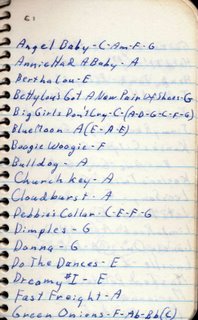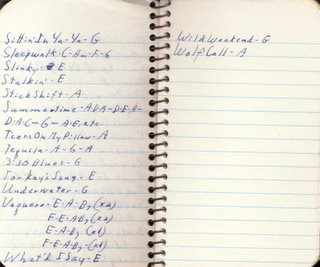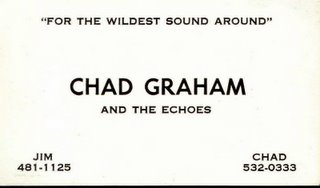To begin with, here is the first photo I have of me playing in a band. This was "The Cavaliers," and there I am on the left sitting at the piano. I had taken 10 years of piano lessons by that time, but this was my first experience playing in a band. I was very nervous; perhaps you can sense my concentration and anxiety as it looks like the band leader, Morris Dubin, is about to whack me for playing a wrong note. The Cavaliers played strictly from sheet music. In later bands, I would learn how to improvise, which was a necessity, because none of the music for those bands was ever written down anyway.

Here is the song list from "The Redlighters," my first high school band that I joined in 1963, when I was 17. You see I had little to go on but the key of the tune. I wrote down the chords in a kind of shorthand music notation and carried this little notebook in my shirt pocket. I would use this same notation until I learned the Nashville Number System upon moving to Nashville in 1998.



I couldn't tell you now what many of those songs sounded like, except that they were guitar-based. You may recognize some of the titles, like Ray Charles' "What'd I Say" and Booker T & the MGs' "Green Onions." The titles of some of the songs (e.g., "Debbie's Collar") sound ridiculous, but perhaps one day I'll research them. Most of the songs were based on the simple chord progressions of the blues, with a minimal amount of vocals. Often no one in the band could sing very well, so we played a fair number of instrumentals. Sometimes we filled up time with blues jams. These were the days before The Beatles invaded America, which was a watershed event for American popular music.
Once my band played a high school prom for Brandywine High School in Prince Georges County, MD. They asked us to play a waltz for the promenade, but the only song we knew in 3/4 time was "Gravy Waltz," a jazz instrumental. We had to slow it down to half its usual speed to be suitable for the purpose. The prom was held in the gym, which was perfect for the purpose, except that it had no electrical outlets. I solved that problem by powering the entire band from the Exit sign, using an adapter and extension cords. I always like to be prepared.
In those pre-Beatles days, bands were often known as "combos" or "dance orchestras." The big band era was just coming to an end. If you look at the Top 40 list from the early 60s, you'll see many Frank Sinatra and other big band hits on the list, and my bands played their fair share of them. (e.g., "Sentimental Journey" and "Night Train." We also borrowed from jazz (e.g., "Misty").
At first I shared an amp with the lead guitar player, who also sang through the same amp. We would drop a microphone down the back of whatever upright piano happened to be handy, and I would bang on the keys as loud as I could. In those days bands used small amplifiers (maybe 40 or 50 watts), sitting the amps on the floor in front of the players so the audience could hear. I didn't play in band with a PA system until college. My college band, "The Strangers" (1964-68) purchased a Bogen 100-watt PA system. It looked like a suitcase - the speakers clipped together, holding the amp in the middle, so you could carry the whole thing in one hand. The open-backed speakers were typically hung on the wall, but basically all the frat boys were looking for was a beat to drink to. I wish I had a nickel for every time we played "Louie, Louie." In fact, I probably did make about a nickel every time we played that song.
But I digress (or do I "progress?") Well, anyway, back to the high school years. Before too long I purchased my own Wurlitzer Electric Piano, along with its own amp. My dad drove me up to Baltimore to Jason's Music, where I purchased the entire rig for about $150 (a lot of lawn mowing for me). The back of the amp came off to make the seat of the piano bench, whose legs also clipped inside of the amp, which was about 60 watts. I played that same setup until my Senior year in college, when I traded the Wurly for a "Panther" electric organ, which was basically a cheap knockoff of a Farfisa organ. By that time (1968), pianos had fallen out of favor in pop music, and I needed the organ sound to reproduce the hits of those days.
In my Junior year of high school, I played in a band called "Chaddy Graham & The Echoes." Here's our card: 
That was my fist band to professionally record. We cut it at Edgewood Studios on K Street in Washington, DC. in two sessions. We put down the instrumentals first, then lead vocals, then a hand-clapping track to emphasize the rhythm. I still have the demo version, which is a metal record covered with a thin layer of plastic, into which the grooves are cut. Our two sides were "I Wanna Do It" and "Do It Anyway You Want." They played the songs over the high school PA system before classes in the morning. I remember the thrill of hearing my own music played and hearing people hum the tune in the hallway. We had visions of stardom, but shortly after we recorded those tunes, The Beatles had their first hit in the U.S. ("I Want To Hold Your Hand"). I remember us thinking that they sounded a lot like us. So we decided to hold off on releasing our song until the new fad subsided. As far as I know, Chaddy still has the old acetate master tapes.

No comments:
Post a Comment